-
AN ISLAND FLOATING ON A STRANGE SEA
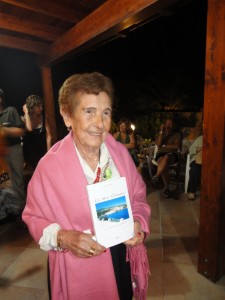 Franca Fadda Silvetti led a most unusual life. For 33 years, she lived with her family on the island of Asinara in Sardinia, Italy. At the time, the island served as a prison. Silvetti’s husband was the prison’s doctor while she was the only teacher for the island’s elementary school where all the young children attended. Trusted prisoners were allowed to roam freely around the island to work outside the prison; one of them was her housekeeper and he also took care of her children. After changing into a high security prison, the island was eventually abandoned and turned into a national park. An intriguing visit to this island led me to a book which Silvetti wrote about her memories on Asinara. Her book eventually led me to her.
Franca Fadda Silvetti led a most unusual life. For 33 years, she lived with her family on the island of Asinara in Sardinia, Italy. At the time, the island served as a prison. Silvetti’s husband was the prison’s doctor while she was the only teacher for the island’s elementary school where all the young children attended. Trusted prisoners were allowed to roam freely around the island to work outside the prison; one of them was her housekeeper and he also took care of her children. After changing into a high security prison, the island was eventually abandoned and turned into a national park. An intriguing visit to this island led me to a book which Silvetti wrote about her memories on Asinara. Her book eventually led me to her.In her book La Mia Asinara, Silvetti describes in detail her arrival on the island.
“I arrived in Asinara on 4th October 1952 with my two sons; Aldo who was 3 years old and Gian Piero who was 2. I was very young and very much in love with my husband Vindice. He had arrived some days before on the island to start his new job as a prison doctor. On his arrival, he fell in love with the island and he sent me a message which read ‘Come here, you will not regret it!’”
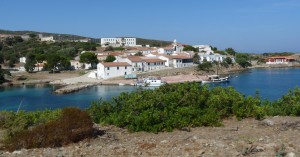 From the first moments, even before she actually stepped on Asinara, Silvetti had to learn to deal with the circumstances of a peculiar life.
From the first moments, even before she actually stepped on Asinara, Silvetti had to learn to deal with the circumstances of a peculiar life.“We went up with our luggage on the boat named Redenzione. Before we left for the island, I looked around at the other passengers. Some policemen were accompanying a group of men of different ages who wore similar clothes. The men were handcuffed and restricted by chains.”
Soon, Silvetti started her new life in a two-floor comfortable house in Cava D’Oliva. All the houses were painted white and they were constructed along a semi-circular area which looked out at the bay. Although initially concerned that prisoners were regularly in contact with the island’s inhabitants, she managed to take this new reality in her stride once her husband assured her that they were safe.
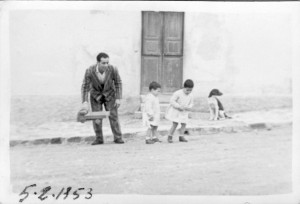 “Luigi was a young handsome Sicilian who was sentenced to 9 years imprisonment after he was found to form part of a group who worked for a renowned thief. He was recommended to us by the prison authorities to help us with the house and with our sons. During our absence, while we were at work, he took care of all the chores and he was also responsible to look after our children and to play with them. Upon our return home, we would find everything in order and the table ready for dinner. There were times when he even prepared our food since he was an excellent cook.”
“Luigi was a young handsome Sicilian who was sentenced to 9 years imprisonment after he was found to form part of a group who worked for a renowned thief. He was recommended to us by the prison authorities to help us with the house and with our sons. During our absence, while we were at work, he took care of all the chores and he was also responsible to look after our children and to play with them. Upon our return home, we would find everything in order and the table ready for dinner. There were times when he even prepared our food since he was an excellent cook.”She started to teach on the 15th October. It did not take her long to realize that teaching in Asinara was quite tiring and challenging but also very satisfying.
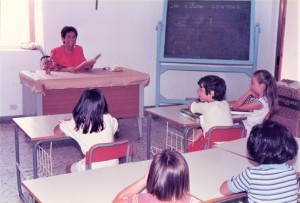 “I had a small classroom which was frequented by 19 children of various ages. Since they had not attended to a kindergarden, most of the children were totally unprepared for schooling. They had no idea about rules and how to behave in groups. To make matters worse, my predecessors had all been males who had found it very difficult to adapt to the solitude of the island and they would often leave the school closed for a whole fortnight.”
“I had a small classroom which was frequented by 19 children of various ages. Since they had not attended to a kindergarden, most of the children were totally unprepared for schooling. They had no idea about rules and how to behave in groups. To make matters worse, my predecessors had all been males who had found it very difficult to adapt to the solitude of the island and they would often leave the school closed for a whole fortnight.”Some of the children lived in the far extremities of the island and they had to ride a carriage which was driven by a trusted prisoner.
“In this particular atmosphere of the island, I was also expected to cope with a form of classism which did not accept that a child of a common policeman would do better in school than the child of a higher person in authority. Often I had to use sheer diplomacy and the use of white lies to help all the children feel good with themselves.”
Prisoners formed part of the daily routine of Asinara’s inhabitants.
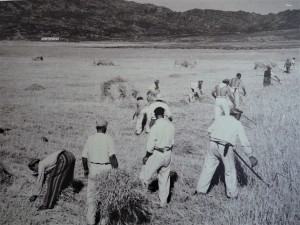 “The school’s caretaker was a prisoner. Each month, the students collected a small sum of money for him which was credited in his account. It was prohibited to give any money directly to a prisoner. Daily needs were catered for by another prisoner who went to each house to take a list of the products which were required such as pasta, sugar and bread. These products would then be brought to each house by an official. In the afternoon, every house would leave a milk container on the window sill. A prisoner would collect these containers so that these will be returned to each house full of milk. Other prisoners worked in the fields with the farmers or helped to make meat products with the butchers. The prisoners were always kept under surveillance. Officials would visit places and houses where these prisoners worked at various times of the day, even when the owners were not present, to confirm that everything was in order.”
“The school’s caretaker was a prisoner. Each month, the students collected a small sum of money for him which was credited in his account. It was prohibited to give any money directly to a prisoner. Daily needs were catered for by another prisoner who went to each house to take a list of the products which were required such as pasta, sugar and bread. These products would then be brought to each house by an official. In the afternoon, every house would leave a milk container on the window sill. A prisoner would collect these containers so that these will be returned to each house full of milk. Other prisoners worked in the fields with the farmers or helped to make meat products with the butchers. The prisoners were always kept under surveillance. Officials would visit places and houses where these prisoners worked at various times of the day, even when the owners were not present, to confirm that everything was in order.”Although it did not rain much on Asinara, its products were bountiful. The inhabitants were almost totally dependent on the island’s products. Meat was provided by the animals which were bred for this reason. Fish were abundant in the transparent water of the surrounding sea. For several years, there was no electricity on the island and people had to use candles and lamps for the night.
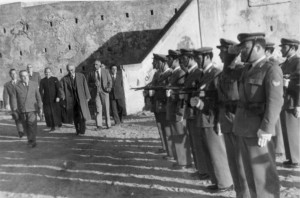 “Like everywhere else, there were good and bad moments but I can say that generally, we lived a pleasant life on Asinara. Matters changed in the 1970s when the prisons were restructured to become high-security penitentiaries to detain some of the most dangerous criminals, such as those that formed part of the Brigate Rosse, terrorists, and mafia members. This development led to the end of an era. My husband and I went on pension in 1985 and we had to leave Asinara.”
“Like everywhere else, there were good and bad moments but I can say that generally, we lived a pleasant life on Asinara. Matters changed in the 1970s when the prisons were restructured to become high-security penitentiaries to detain some of the most dangerous criminals, such as those that formed part of the Brigate Rosse, terrorists, and mafia members. This development led to the end of an era. My husband and I went on pension in 1985 and we had to leave Asinara.”My visit to Asinara was quite stirring and profoundly emotional. After reading Silvetti’s book, I felt an urge to seek her out and contact her. I was thrilled when she reached back to me and responded to my questions.
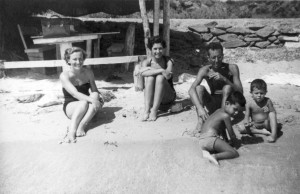
 “After living intensely for 33 years on the island, I felt as if Asinara was my own property. I wrote this book because I wanted to leave a valuable memory to my two sons and daughter Silvia and to their own children so that they would know how we lived on that island. It was a need of mine, especially after my dear husband passed away.”
“After living intensely for 33 years on the island, I felt as if Asinara was my own property. I wrote this book because I wanted to leave a valuable memory to my two sons and daughter Silvia and to their own children so that they would know how we lived on that island. It was a need of mine, especially after my dear husband passed away.”On asking how did it feel to live on a prison island, she responded, “I have never felt in danger. I felt much pity for the prisoners who were deprived of their freedom, were under constant guard, and far from their loved ones especially during feasts.”
I was curious to know whether her children were influenced by such a life?
“Each day we saw the prisoners going on their work like everyone else. It was a normal fact of life. We never saw them imprisoned but always living amongst us. They left no negative impressions on my children’s childhood.”
Did she ever feel like a prisoner herself on such a lonely island?
“No, I never felt like a prisoner. I had my own family and my own job. There were moments when we suffered some inconveniences because of bad weather which did not allow us to reach the mainland but I never felt imprisoned.”
She was 92 years old when I contacted her. She had never returned to the island.
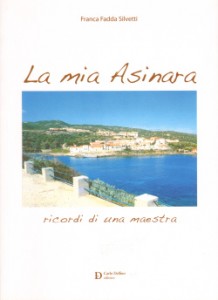 “I did not have the courage to return. Maybe, egoistically speaking, and due to the lovely memories I had on the island, it would have been better to leave Asinara inhabited by a strange population than to abandon it to its present state, to become a tourist attraction. For me Asinara is my whole life and now that I’m old, its memories help me to live a serene life.”
“I did not have the courage to return. Maybe, egoistically speaking, and due to the lovely memories I had on the island, it would have been better to leave Asinara inhabited by a strange population than to abandon it to its present state, to become a tourist attraction. For me Asinara is my whole life and now that I’m old, its memories help me to live a serene life.”Franca Fadda Silvetti passed away at the age of 94 but her memory is still much alive in her inspiring book.
(This article was published in the SENIOR TIMES – APRIL 2018 issued with The Times of Malta newspaper)